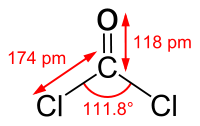
Photo from wikipedia
Abstract Coking wastewater concentrate (CWC) generated during the membrane filtration process is difficult to treat mainly due to its higher chloridion concentration. Advanced oxidation process is ineffective in treating CWC… Click to show full abstract
Abstract Coking wastewater concentrate (CWC) generated during the membrane filtration process is difficult to treat mainly due to its higher chloridion concentration. Advanced oxidation process is ineffective in treating CWC because of the quenching effect of chloridion on hydroxyl radicals. In this study, peroxymonosulfate (PMS)/chloridion process was developed to treat CWC, and 2,4-dimethyphenol (DMP) was selected as targeted pollutant to investigate the reaction mechanism of PMS/chloridion process. Unlike the traditional view that hypochloride acids are the main active species during the PMS/chloridion process, it was found that singlet oxygen, hypochloric acids and chlorine radicals contributed to the degradation of DMP, which was evidenced by the quenching experiments, electron paramagnetic resonance spectroscopy and identified degradation products. Based on the degradation products, the possible degradation pathway of DMP was tentatively proposed. The PMS/chloridion process can be applied in a wide pH range from 3 to 8. The optimal ratio of PMS to chloridion was 1:1 for mineralizing DMP in which the maximum mineralization of DMP reached 33.3%. The PMS/chloridion process can effectively remove COD and colourity of actual CWC. However, the ratio of PMS to chloridion varied with the initial COD concentration of CWC. This study provides a novel treatment process for CWC, and an insight into the removal mechanism of the PMS/chloridion process.
Journal Title: Chemical Engineering Journal
Year Published: 2020
Link to full text (if available)
Share on Social Media: Sign Up to like & get
recommendations!